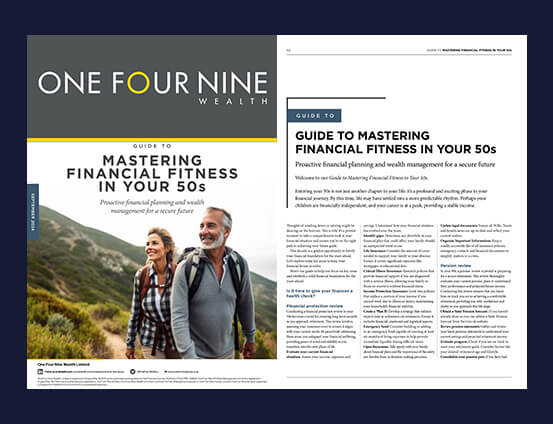One Four Nine Wealth – Guide to financial fitness in your 50s
Proactive financial planning and wealth management for a secure future.
Entering your 50s is not just another chapter in your life; it’s a profound and exciting phase in your financial journey. By this time, life may have settled into a more predictable rhythm. Perhaps your children are financially independent, and your career is at a peak, providing a stable income.

Thoughts of winding down or retiring might be dancing on the horizon. This is why it’s a pivotal moment to take a comprehensive look at your financial situation and ensure you’re on the right path to achieving your future goals. This decade is a golden opportunity to fortify your financial foundation for the years ahead.
Entering your 50s is not just another chapter in your life; it’s a profound and exciting phase in your financial journey. By this time, life may have settled into a more predictable rhythm. Perhaps your children are financially independent, and your career is at a peak, providing a stable income. Thoughts of winding down or retiring might be dancing on the horizon. This is why it’s a pivotal moment to take a comprehensive look at your financial situation and ensure you’re on the right path to achieving your future goals. This decade is a golden opportunity to fortify your financial foundation for the years ahead.
Is it time to give your finances a health check?
Financial protection review
Conducting a financial protection review in your 50s becomes crucial for ensuring long-term security as you approach retirement. This review involves assessing your insurance cover to ensure it aligns with your current needs. By proactively addressing these areas, you safeguard your financial wellbeing, providing peace of mind and stability as you transition into the next phase of life.
Evaluate your current financial situation: Assess your income, expenses and savings. Understand how your financial situation has evolved over the years.
Identify gaps: Determine any shortfalls in your financial plan that could affect your family should an unexpected event occur.
Life Insurance: Consider the amount of cover needed to support your family in your absence. Ensure it covers significant expenses like mortgages or educational fees.
Critical Illness Insurance: Research policies that provide financial support if you are diagnosed with a serious illness, allowing your family to focus on recovery without financial stress.
Income Protection Insurance: Look into policies that replace a portion of your income if you cannot work due to illness or injury, maintaining your household’s financial stability.
Create a ‘Plan B’: Develop a strategy that outlines steps to take in unforeseen circumstances. Ensure it includes financial, emotional and logistical aspects.
Emergency fund: Consider building or adding to an emergency fund capable of covering at least six months of living expenses to help provide immediate liquidity during difficult times.
Open discussions: Talk openly with your family about financial plans and the importance of the safety net. Involve them in decision-making processes.
Update legal documents: Ensure all Wills, Trusts and beneficiaries are up-to-date and reflect your current wishes.
Organise Important Information: Keep a readily accessible file of all insurance policies, emergency contacts and financial documents to simplify matters in a crisis.
Read our six-page guide to financial fitness in your 50s below.
The value of pensions and the income they produce can fall as well as rise. You may get back less than you invested.











